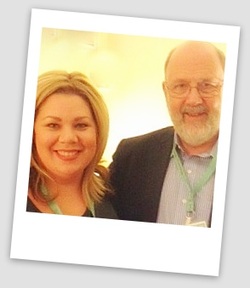|
|
 Last week I was in Baltimore for the annual, Society of Biblical Literature and American Academy of Religion meeting. Thanks to an invitation from my new BFF Joel Watts, I joined a small gathering of bible bloggers for an intimate conversation with N.T. Wright on his latest 1700 page tome, “Paul and the Faithfulness of God.” In the two volume work, Wright sets forth to discuss Paul in terms of God, the people of God and the future of the people of God through the Jewish theological lenses of monotheism, election and eschatology. Throughout, Wright reminds us these are the central Jewish themes Paul is rethinking through Jesus and Spirit. To understand Paul’s worldview, Wright masterfully situates Paul within the three realms of his universe, Jewish, Greek and Roman Empire. With a twinkle in his eye, sipping hot tea as he tries to recover from a brutal travel schedule, Wright reminds us that he is offering Paul as a “refreshed” Jewish thinker who is refocusing Jewish theology around Jesus and Spirit. We lean forward, hands feverishly typing his every word into our devices, he argues Paul did this thinking in the service of his mission, to plant communities of Jesus followers in Caesar’s world who would be shaped by the gospel and carry this gospel out to the world. Though Paul is not a systematic theologian, for Wright, he is on league with Plato and Aristotle in his ability to take abstract concepts, argue with passion and understand these concepts in ways that pertain to faith. I am struck again at this original pastor/scholar who is able to communicate high ideals in practical ways to a given context for the good of God’s church. Wright leans back, hands folded like church and steeple and says, “Philosophy, religion and politics are all reconciled in Paul.” My thumbs typing at a dizzying speed, I take notes on my i-phone, I do not want to miss a single syllable of this diatribe—this modern day pastor/scholar whom I have read through formative years, whose words helped me know Jesus. I am at once caught, head finds heart and my eyes flood with tears as Wright explains why he began the work with the letter to Philemon; tells us to listen for echoes of the Exodus in the short letter regarding Onesimus, slave and convert of Christ. Slavery was a complicated and delicate social relationship in the ancient world, as was marriage, the role of women, the chasm of Jew and Gentile. As I read through this work, words dance off the page as Wright gives us Paul, arms stretched out in cross formation to master and slave and call them to be reconciled. Not only here but to the women of Philippi, Euodia and Syntyche, to Jews and Gentiles, this is the heart of Paul’s gospel; be reconciled in Christ Jesus. I am reminded again why scholarship matters, why I have spent my life pouring over ancient manuscripts and why I am always captivated at the discovery of some stele or antiquated fragment. I remember why I have decided to occupy my days with Paul and Jesus and the women who served with them; it is-- all of it-- for the good of the church and the ministry of reconciliation.
4 Comments
|
Subscribe Today for Free GiftBLOG
Archives
June 2019
Categories
All
|

 RSS Feed
RSS Feed